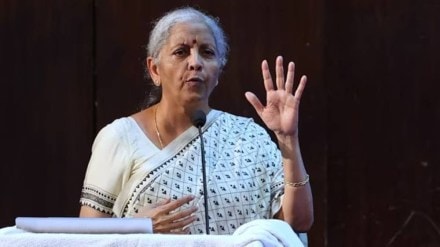Finance Minister Nirmala Sitharaman said the Confederation of All India Traders (CAIT) has reported Rs 6.05 lakh crore worth of festival sales this year, as per a report by CNBC-TV18, flecting strong consumer sentiment following the implementation of new GST reforms.
Speaking at the inaugural ceremony of the new CGST building in Ghaziabad, Sitharaman said the simplified GST registration process will kick in from November 1, as per a report by CNBC-TV18. She said the new system is designed to ease business operations and improve transparency. “The CBIC has worked for over a year to bring in next-generation GST reforms,” Sitharaman added.
The Finance Minister also noted that India’s festive season has boosted economic activity, creating nearly 50 lakh temporary jobs across sectors.
FM urges polite and empathetic approach towards taxpayers
Sitharaman also said that GST officers should be polite and empathetic in dealing with honest taxpayers and asked them to use technology for faster registration approvals and grievance redressal, as per a report by PTI.
She also asked field formations to “proactively” undertake trade facilitation measures. “There is no iron wall between you and trader, there is thin air. You can understand where the difficulty is, rather than muddy it up any further,” she said.
Sitharaman seeks accountability within CBIC
The minister flagged the need for timely conclusion of any disciplinary proceedings against officers of Central Board of Indirect Taxes and Customs (CBIC). This would send a clear message from the CBIC board that any misconduct, dereliction of duty or unethical behaviour by officers will not be tolerated.
She said the ultimate goal of tax administration is to make life easy for honest taxpayers and to do that GST officers should follow the laid down SoP and show greater empathy and courtesy.
“It is important that you remain polite. The next-generation GST is not just about rates, slabs, simplification. It should make the taxpayer feel different,” she said, adding that politeness, however, should not be seen as a compromise on enforcement.
While advocating that honest taxpayers should be “honourably treated”, Sitharaman also said that laid down SoP should be followed to bring the “bad sheep” to the books. “But don’t look at everybody with suspicion,” the minister said.
“I do not want comfort given to dishonest taxpayers in any way. You do not have to be subjective with them (dishonest taxpayers), there is a laid protocol, deal with them in that way…be polite and get your work done as per the SoP”, she said.
FM urges GST officers to leverage technology
The minister also nudged Goods and Services Tax (GST) officers to make use of technology to reduce the compliance burden on taxpayer seeking GST registration.
“Technology and risk-based parameters must do the heavy lifting and not the taxpayer. We do not want anybody from the field formation adding one little more burden or onus on the taxpayer. Technology should be used. You do smart inquiry into the situation and if necessary the taxpayer may be approached for something. But no shifting of onus on him saying give me more papers, give me this, give me that,” she said.
She also asked officers to map the recurring grievances in Central GST (CGST) zones and reach at the “root cause” of the problem.
Sitharaman calls for swift conclusion of disciplinary cases to ensure accountability
On the issue of disciplinary proceedings against departmental officers, Sitharaman said swift conclusion of such proceedings reinforces accountability within the organization. It also clears up the perception that public has that there is a level of indifference or protectionism which prevails among officers that weaken one’s moral authority.
“The motto for disciplinary matters therefore should be: Galat kiya hai toh khair nahi, sahi kiya toh koi bhaye nahi (If you do wrong, you won’t be forgiven, if you do right, you need not fear),” Sitharaman said.
She also said that the pending GST investigations must be closed expeditiously with quality orders that are well reasoned and evidence based and cut down litigation cost.
With the input from PTI
